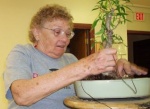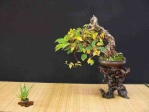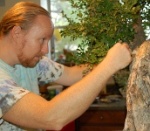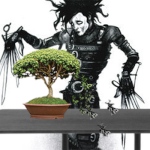Expanded slate
+5
Sakaki
abcd
Mitch Thomas
bonsaisr
franke65
9 posters
Page 1 of 1
 Expanded slate
Expanded slate
Does anyone have any experience using expanded slate (products such as PermaTill or Rocks) in your soil? I am experimenting with some repots and some new this year using this as my sole soil. Holds water well, and should lead to somewhat less watering. It's pH neutral, so an acidifier such as sulfur or citric acid diluted could be used, and micro-nutrients added. Also seems to be tough enough to withstand breaking down. Otherwise I'm using John Naka's standard blood meal/cottonseed meal fertilizer.
Very interested in hearing anyone's experience or thoughts
Very interested in hearing anyone's experience or thoughts
franke65- Member
 Expanded Slate
Expanded Slate
I think you mean expanded shale. It is sold in the Midwest as Haydite. There is a company in Albany that sells it around here as Corlite. It is rather heavy, but still porous. I use it in my coarse conifer mix instead of Turface. Seems to work.
Iris
Iris

bonsaisr- Member
 Expanded slate?
Expanded slate?
I'm pretty certain that both mfr.'s called it slate, but I'm not sure if those are synonyms. Picture attached.
It's very light and comes in pretty large bags.
I'm going to search Corlite.
Thanks

It's very light and comes in pretty large bags.
I'm going to search Corlite.
Thanks

franke65- Member
 Re: Expanded slate
Re: Expanded slate
Looks like the by product of shale proccessing. One way to track it down is to locate a company that manufactures what we call cinder block or cement blocks. It's the chief component in thier construction. Haydite is the standard name here. You can by it by the screen size, 1/16" thru 1/2" for about $75.00 per cubic yard.
Good luck
Mitch
Good luck
Mitch
Mitch Thomas- Member
 Re: Expanded slate
Re: Expanded slate
Turface (pumice) is for me the best substrate for growing trees in pots, a substrate very well, HP: 7, and the proportion of nitrogen in the blood , except for young trees , is too large, it is my experience,

abcd- Member
 Re: Expanded slate
Re: Expanded slate
Turface (pumice) is for me the best substrate for growing trees in pots, a substrate very well, HP: 7, and the proportion of nitrogen in the blood , except for young trees , is too large, it is my experience, the photographie is granulate turface

abcd- Member
 Expanded Slate
Expanded Slate
I don't know about France, but in this country Turface (a brand name) is high fired clay. It is somewhat lighter than the expanded shale, and more absorbent. It is similar to cat litter. There are one or two brands of cat litter in Europe that are suitable for bonsai, but not here.
FWIW, I use Corlite, the expanded shale, in my conifer mix and Turface in my regular mix.
There is another product available similar to Turface, that is chopped up diatomite. It is pink when dry, reddish when wet. That is actually what I am using instead of Turface. It is very light and I think it is more absorbent than Turface. I use less of it.
Most of us in the Northeast don't use pumice (perlite) in bonsai soil because it floats to the top when it rains.
Iris
FWIW, I use Corlite, the expanded shale, in my conifer mix and Turface in my regular mix.
There is another product available similar to Turface, that is chopped up diatomite. It is pink when dry, reddish when wet. That is actually what I am using instead of Turface. It is very light and I think it is more absorbent than Turface. I use less of it.
Most of us in the Northeast don't use pumice (perlite) in bonsai soil because it floats to the top when it rains.
Iris

bonsaisr- Member
 Re: Expanded slate
Re: Expanded slate
bonsaisr wrote:I don't know about France, but in this country Turface (a brand name) is high fired clay. It is somewhat lighter than the expanded shale, and more absorbent. It is similar to cat litter. There are one or two brands of cat litter in Europe that are suitable for bonsai, but not here.
FWIW, I use Corlite, the expanded shale, in my conifer mix and Turface in my regular mix.
There is another product available similar to Turface, that is chopped up diatomite. It is pink when dry, reddish when wet. That is actually what I am using instead of Turface. It is very light and I think it is more absorbent than Turface. I use less of it.
Most of us in the Northeast don't use pumice (perlite) in bonsai soil because it floats to the top when it rains.
Iris
Dear bonsaisr,
pumice = perlite?
I dont think so.
Taner

Sakaki- Member
 Re: Expanded slate
Re: Expanded slate
hi
I find these expanded products are excelent as an ingredient in a soil mix recipe but I have not personally seen one single tree collection that has a variety of refined species all looking incredible in them neat. As an initial soil for the first year or 2 of a newly dug tree they work quite well mixed with sphagnum moss 50/50 when roots are regrowing though.
I think if you accept they are excelent as a 'filler' ingredient to help balance moisture and water retention then using anything from 10-30% depending upon the tree is benifitial - but I really dont think which brand or type you use makes the slightest difference to your finished bonsai when used at theese percentages - they vary by name, composition and description from Europe to the USA too but the role within the soil is basically the same - to hold a little water for slower release to the roots.
so i say use the cheapest, easiest to source version in your area. In the Uk I bought it as "superlite black" from supplier Kaizen at £21.00 + DEL for 50 liters because i was putting a larger order together. Another very similar, maybe the exact same? product is [url=lightweight expanded clay]http://www.specialistaggregates.com/lightweight-expanded-clay-aggregate-p-1173.html?gclid=CIvrpr__9K8CFQ1lfAod2BofEg[/url] this works out at roughly £11.00 per 50 liter bag delivered if you buy 20 bags so would suit a group, club or larger grower - you can insulate the loft with it too, so two birds with one stone maybe
I like this stuff in my mix, i would never use it entirely as the soil mix though.
(Perlite is a volcanic obsidian glass - a very fine dense glass compound that forms in 'gentle' lava flows - Horticultural perlite is the same stuff heat treated to make it expand like pop corn.
Pumice is formed naturally when lava decompresses rapidly and mixes with air ie violent eruption - pumice can vary in actual composition hugely, perlite is basically obsidian
In a simplefied way slate comes from shale - shale is a sedimentary rock & slate is a metamorphic rock formed from shale so similar ingredients but different finished product.)
cheers Marcus
I find these expanded products are excelent as an ingredient in a soil mix recipe but I have not personally seen one single tree collection that has a variety of refined species all looking incredible in them neat. As an initial soil for the first year or 2 of a newly dug tree they work quite well mixed with sphagnum moss 50/50 when roots are regrowing though.
I think if you accept they are excelent as a 'filler' ingredient to help balance moisture and water retention then using anything from 10-30% depending upon the tree is benifitial - but I really dont think which brand or type you use makes the slightest difference to your finished bonsai when used at theese percentages - they vary by name, composition and description from Europe to the USA too but the role within the soil is basically the same - to hold a little water for slower release to the roots.
so i say use the cheapest, easiest to source version in your area. In the Uk I bought it as "superlite black" from supplier Kaizen at £21.00 + DEL for 50 liters because i was putting a larger order together. Another very similar, maybe the exact same? product is [url=lightweight expanded clay]http://www.specialistaggregates.com/lightweight-expanded-clay-aggregate-p-1173.html?gclid=CIvrpr__9K8CFQ1lfAod2BofEg[/url] this works out at roughly £11.00 per 50 liter bag delivered if you buy 20 bags so would suit a group, club or larger grower - you can insulate the loft with it too, so two birds with one stone maybe
I like this stuff in my mix, i would never use it entirely as the soil mix though.
(Perlite is a volcanic obsidian glass - a very fine dense glass compound that forms in 'gentle' lava flows - Horticultural perlite is the same stuff heat treated to make it expand like pop corn.
Pumice is formed naturally when lava decompresses rapidly and mixes with air ie violent eruption - pumice can vary in actual composition hugely, perlite is basically obsidian
In a simplefied way slate comes from shale - shale is a sedimentary rock & slate is a metamorphic rock formed from shale so similar ingredients but different finished product.)
cheers Marcus

marcus watts- Member
 Re: Expanded slate
Re: Expanded slate
marcus watts wrote:hi
I find these expanded products are excelent as an ingredient in a soil mix recipe but I have not personally seen one single tree collection that has a variety of refined species all looking incredible in them neat. As an initial soil for the first year or 2 of a newly dug tree they work quite well mixed with sphagnum moss 50/50 when roots are regrowing though.
I think if you accept they are excelent as a 'filler' ingredient to help balance moisture and water retention then using anything from 10-30% depending upon the tree is benifitial - but I really dont think which brand or type you use makes the slightest difference to your finished bonsai when used at theese percentages - they vary by name, composition and description from Europe to the USA too but the role within the soil is basically the same - to hold a little water for slower release to the roots.
so i say use the cheapest, easiest to source version in your area. In the Uk I bought it as "superlite black" from supplier Kaizen at £21.00 + DEL for 50 liters because i was putting a larger order together. Another very similar, maybe the exact same? product is [url=lightweight expanded clay]http://www.specialistaggregates.com/lightweight-expanded-clay-aggregate-p-1173.html?gclid=CIvrpr__9K8CFQ1lfAod2BofEg[/url] this works out at roughly £11.00 per 50 liter bag delivered if you buy 20 bags so would suit a group, club or larger grower - you can insulate the loft with it too, so two birds with one stone maybe
I like this stuff in my mix, i would never use it entirely as the soil mix though.
(Perlite is a volcanic obsidian glass - a very fine dense glass compound that forms in 'gentle' lava flows - Horticultural perlite is the same stuff heat treated to make it expand like pop corn.
Pumice is formed naturally when lava decompresses rapidly and mixes with air ie violent eruption - pumice can vary in actual composition hugely, perlite is basically obsidian
In a simplefied way slate comes from shale - shale is a sedimentary rock & slate is a metamorphic rock formed from shale so similar ingredients but different finished product.)
cheers Marcus
Marcus, thanks for clarification and correction.
I forgot to write in this thread yesterday. You saved me

Sakaki- Member
 Re: Expanded slate
Re: Expanded slate
We had an experienced Bonsai "master" come through our club recently who claimed that both Expanded Shale and Turface (baked clay product) are unsuitable for Bonsai because both contain salt. He claimed that most of our issues with leaf burn (keeping in mind this is central Texas) have to do with salt buildup in our soils, and this is caused by both our fertilizer and soils that contain salt, so said never to use these two soil ingredients. He spoke with a certain finality, as if it were common knowledge. I've looked online to see if anything about Haydite (Expanded Shale) lists salt and can find nothing. Does anyone have any knowledge about this?? I can't imagine that this is true, and have personally been using both for years without problem.

JMcCoy- Member
 Re: Expanded slate
Re: Expanded slate
Joey,
Makes me almost glad I missed yesterday's meeting, otherwise, I will be twitching on my seat LOL. If anything, I believe Turface prevents salt build-up since water just go through it and washes off any salt.
Makes me almost glad I missed yesterday's meeting, otherwise, I will be twitching on my seat LOL. If anything, I believe Turface prevents salt build-up since water just go through it and washes off any salt.

Poink88- Member
 Re: Expanded slate
Re: Expanded slate
JMcCoy wrote:We had an experienced Bonsai "master"
I think there are probably only one or two alive in the world !, and not doing the rounds visiting clubs
It is safe to say 10's of 1000's of bonsai growers use these soil ingredients and we have pretty good trees - so you need to actually question a "master" when evidence points otherwise. I would agree that leaf damage could occur using 100% exp clays and just chemical fertilisers if you have poor quality water and the trees dry out daily, but that is not how many use it.
If you follow my link it gives the chemical composition of the expanded clay used in this particular product - and why are you actually worried about salt ? black pines grow in sand behind beaches quite happily, and 100's of great trees are living on sea cliffs across the world - there are several miles of oak, hawthorn and blackthorn trees hanging off the cliffs where i bass fish - no scorching and they are battered by the Atlantic
Mineral build up in leaves, causing a scorched edge, is a bonsai problem if poor quality water is used and trees dry out too easily - but it has a lot to do with strong chemical fertilisers and the wrong soil type drying out too much between watering, but not really about salt as in sodium chloride.
cheers -
Marcus

marcus watts- Member
 Re: Expanded slate
Re: Expanded slate
Thanks Marcus, it seemed a ridiculous statement to make, that the fresh aggregate contained salt.. this is why I figured I'd bring it up here and see how the ball bounced. The discussion on salt damage was specifically related to Japanese Maples, that our heat wasn't the issue as some think, but rather that it is a chemical "burn" as the tips transpire water too quickly leaving the salt behind. All good info, as well as the one about using chemical fertilizers which will also add salt to the soil, but the issue of salt in Turface and Haydite was mentioned several times, and I just couldn't fathom why it would be added. He must have just gotten bad info.
Dario - not to cast shade on our speaker (who is well qualified with years in Bonsai), but there were a few issues that I found myself twitching around in my seat as well! We can talk about it privately sometime.
Dario - not to cast shade on our speaker (who is well qualified with years in Bonsai), but there were a few issues that I found myself twitching around in my seat as well! We can talk about it privately sometime.

JMcCoy- Member
 Expanded slate
Expanded slate
Thanks to all who have joined in this discussion. I am attempting this experiment on azaleas, pine,maples and one gigantic pussy-willow, and so far they all seem to thrive. I have changed from using dilute citric acid to sulfur in small quantities sprinkled on top of the soil. The micro-nutrients are a diluted liquid formula for container plants specified by the mfr.
I'll write again as the season goes on and perhaps include a few pictures.
I'll write again as the season goes on and perhaps include a few pictures.
franke65- Member
 Re: Expanded slate
Re: Expanded slate
I have heard about this Turface/salt fear. There maybe a misunderstanding though because I thought the worry was that the Turface can get a build up of salts "in" them. To murkily clarify; salts, which all fertilizers can be considered (i.e. The inorganic salts, including sodium, potassium, calcium, chloride, phosphate, sulphate, nitrogen etc) are affected by many things such as pH and electronics and enzymes. Sometime salts can get built up and stuck in materials and this is the claim and it is possible. Imbalances can happen but usually other balancing forces make up for it such as super drainage, occasional amendments of chemicals to release salts, amendments of biologicals such as humic acid etc.. I have had problems with it--but with all substrates, just more with fine ones or long term (10year) substrate/soils. I really believe the source of this Turface/salt fear is linked with the use of really bad water (high mineral,high pH) which I have heard is not uncommon in CA and TX. I believe my 7.9 pH mineralized well water has caused long term decline with some of containerized plants I have and I had to make adjustments. Collecting and using rainwater has eliminated the problem for me. Now I actually have to watch my lime lovers. Anyways, I think Turface is a good product and that ANY substrate can get imbalanced and locked up especially fine ones or long term ones like my larch substrate (40%-3/32'' Turface, 30%- 1/8'' organics, 20% 3/32'' sand).
crust- Member
 Expanded slate
Expanded slate
I certainly agree that salts can build up and harm the root systems beyond repair, even on the sides and bottom of your container, and it is certainly something that should be watched and followed closely.
In an attempt to get around that problem using 100% expanded shale, I use blood meal/cottonseed meal as my fertilizer since it releases nutrients gradually and not in a salt formula. My plan is once a month to add micro-nutrients from a commercially produced liquid diluted for containerized plants, and to raise pH with a slight application of sulfur on top of the soil where it can be washed in with watering. In my humble estimation that should keep my concerns about salt build-up at a minimum. Wish me well on that one!!
I am open to any criticism or recommendations concerning this effort!
In an attempt to get around that problem using 100% expanded shale, I use blood meal/cottonseed meal as my fertilizer since it releases nutrients gradually and not in a salt formula. My plan is once a month to add micro-nutrients from a commercially produced liquid diluted for containerized plants, and to raise pH with a slight application of sulfur on top of the soil where it can be washed in with watering. In my humble estimation that should keep my concerns about salt build-up at a minimum. Wish me well on that one!!
I am open to any criticism or recommendations concerning this effort!
franke65- Member
 Similar topics
Similar topics» slate slabs
» Slate Bonsai Pot
» Show us your bench(s)
» A slate, a tree and some moss!!!!!
» Expanded clay aggregate, Hydro pebbles
» Slate Bonsai Pot
» Show us your bench(s)
» A slate, a tree and some moss!!!!!
» Expanded clay aggregate, Hydro pebbles
Page 1 of 1
Permissions in this forum:
You cannot reply to topics in this forum






